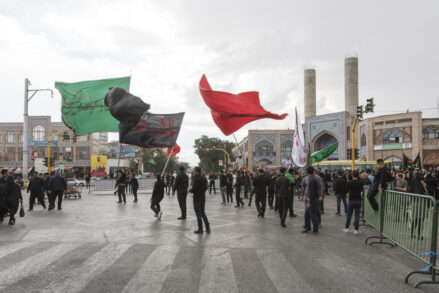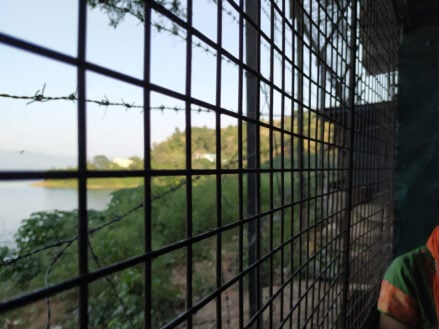Photo: Global Christian Relief CEO Dr. David Curry testified before the Tom Lantos Human Rights Commission on Capitol Hill.
On any given day in Washington D.C., when Congress is in session, the 435 members of the House of Representatives and 100 members of the Senate, along with their staff, will conduct thousands of meetings. Some will be confidential or even classified, while others will involve hundreds of participants.
Members will be called to their respective floors in the Capitol building to vote on legislation, and a couple of dozen hearings are likely to be held. Every once in a while, one of these hearings might draw in millions of viewers and widespread news coverage. But for the most part, they take place in the background, largely out of sight of the broader public.
Such was the case on Thursday, June 27, when Global Christian Relief CEO Dr. David Curry testified before the Tom Lantos Human Rights Commission on Capitol Hill. A few dozen Congressional staff, interns and representatives from NGOs watched and took notes as Dr. Curry, along with Ambassador Sam Brownback and other witnesses, expounded on the state of religious freedom violations committed against Christians around the globe. The numbers were staggering and the stories heart-wrenching, but it was perhaps the least interesting part of Dr. Curry’s testimony that could, in the end, make all the difference.
One small recommendation
As Dr. Curry concluded his testimony, he recommended that “the U.S. State Department must ensure that Foreign Service Officers (FSOs), detailees, and other appropriate staff at U.S. Embassies and posts overseas are provided sufficient time and resources to develop a thorough understanding of religious freedom conditions in their respective postings. And that they be required to dedicate this time and these resources to build robust networks with faith actors in-country.”
For many, this dry-sounding paragraph may not seem all that important. After all, how exactly will any of this help Christians who are forced into meeting underground by heavy-handed dictatorships; or are threatened with death by family members because of their decision to convert from another religion?
The answer is probably best explained by the story of a visit to a U.S. embassy in the heart of one of Asia’s most vibrant capital cities.
A meeting that mattered
The year was 2015 and sitting across from a friend and me were senior-level Foreign Service Officers tasked with representing U.S. interests in this country. As we proceeded to explain the purpose of our visit—that we were meeting with hundreds of Christians who had reportedly been cut off from their communities and violently attacked; and that we would be meeting with prominent religious leaders and traveling into some of the more dangerous parts of the country—two things happened.
First, it became clear that they had little to no idea what we were talking about. Not only did they have little contact with Christian leaders in the country, they had never heard the reports we were sharing, even though they had been published online for months.
Second, it also became clear they didn’t believe there was much cause for concern. One of the officers grew impatient, pointing out that they had a lot of issues to deal with and that even if they did raise this issue with their counterparts in the foreign government, they would likely be ignored.
We tried to make the argument that it was worth raising nonetheless, knowing that if they did, it could mean relief for hundreds of persecuted individuals. When our meeting concluded, we left without a commitment to try and address the issue—and little hope the United States would be prioritizing religious freedom in this country anytime soon.
Unfortunately, this type of response isn’t all that unusual. While there are some notable exceptions, many of the thousands of Foreign Service Officers at the more than 270 U.S. embassies, consulates and other diplomatic missions overseas either aren’t interested, or haven’t been asked to invest serious resources into religious freedom issues. Congress took a major step towards addressing this in 2016 with the passage of the Frank Wolf International Religious Freedom Act, which requires all Foreign Service Officers to have some training on religious freedom. The act is a sweeping improvement to religious freedom in U.S. foreign policy, but the one-off training it requires of FSOs doesn’t necessarily obligate these officers to spend any of their time in-country working to promote religious freedom.
Lives at Stake
So why is this important? Because ultimately, what the United States government chooses to prioritize in its relationship with other countries can have tremendous impact. Foreign Service Officers and other staff at U.S. embassies are the daily voice of the United States in these countries. When they understand clearly what’s happening, have strong networks with faith leaders in-country and are given the time to raise these issues, it can make a world of difference for the persecuted church.
Thousands of innocent victims of religious persecution have been set free from detention or prison because of the work of U.S. embassy personnel. And in many cases where Christians would have faced violence, they instead received protection because someone at a U.S. embassy was willing to plead their case. If such feats can be accomplished with even a small level of effort, how much more could be achieved if this became a top priority at every single post?
This is also why it’s critical that Global Christian Relief and others never stop taking the time to appear before Congress, to testify on behalf of the persecuted, even in the midst of the thousands of other issues being worked on in Washington. Only a few may be there to listen, but that may be all it takes.
After all, the hearing on June 27 was held by Congressman Chris Smith, a senior member of the House Foreign Affairs Committee and the champion of the Frank Wolf International Religious Freedom Act. What may have slipped by as just a dry policy recommendation on just another day in Washington may, in the end, bring freedom and peace to many.
Isaac Six serves as director of advocacy for Global Christian Relief and is based in Washington D.C. He has worked on religious freedom issues and Christian persecution in Washington D.C., for nearly eight years, including inside and outside of government, and has traveled extensively to meet with victims of religious freedom violations around the globe.






